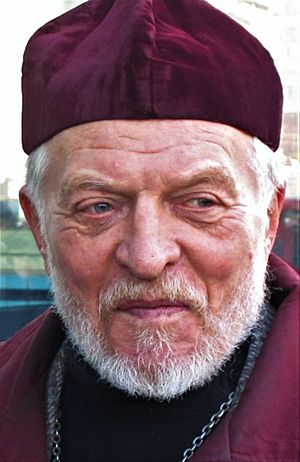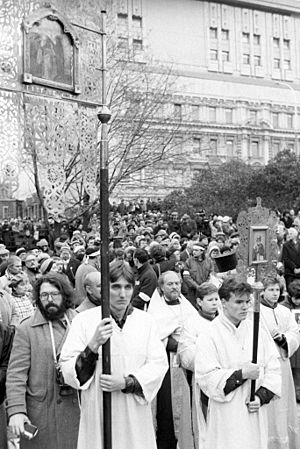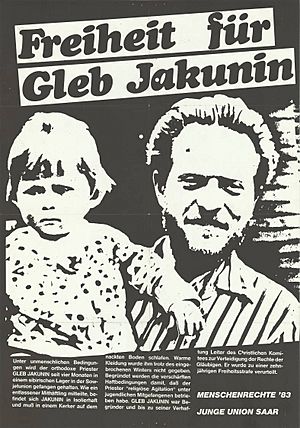Gleb Yakunin facts for kids
Quick facts for kids
Gleb Yakunin
|
|
|---|---|
|
Глеб Павлович Якунин
|
|

Gleb Yakunin at a pro-democracy rally in Moscow, November 2012
|
|
| Member of the Supreme Soviet of Russia | |
| In office 1990 – 12 December 1993 |
|
| Succeeded by | Position abolished (Himself as a member of the State Duma) |
| Member of the State Duma | |
| In office 12 December 1993 – 17 December 1995 |
|
| Preceded by | Position established (Himself as a member of the Supreme Soviet of Russia) |
| Personal details | |
| Born | 4 March 1936 Moscow, Russian SFSR, Soviet Union (now Russia) |
| Died | 25 December 2014 (aged 78) Moscow, Russia |
| Political party | Democratic Choice of Russia |
Gleb Pavlovich Yakunin (Russian: Глеб Па́влович Яку́нин; born March 4, 1936 – died December 25, 2014) was a Russian priest. He was also a dissident, meaning he spoke out against the government. He strongly believed in freedom of conscience, which means people should be free to believe what they want. He lived in the Soviet Union when it was a communist country. Gleb Yakunin was part of the Moscow Helsinki Group, which worked to protect human rights. He was also elected to important government roles, like the Supreme Soviet of Russia and the State Duma, between 1990 and 1995.
Contents
Gleb Yakunin's Early Life and Priesthood
Gleb Pavlovich Yakunin grew up in a family that loved music. He studied biology at the Irkutsk Agricultural Institute. In the late 1950s, he changed from not believing in God to becoming an Eastern Orthodox Christian. He met Alexander Men, who influenced him greatly. In 1959, he finished his studies at the Moscow Theological Seminary of the Russian Orthodox Church. In August 1962, he became a priest. He was then assigned to a parish church in Dmitrov, a city near Moscow.
Speaking Out for Religious Freedom
In 1965, Gleb Yakunin and another priest, Nikolai Eschliman, wrote an open letter. They sent it to the head of the Russian Orthodox Church, Alexius I. In this letter, they argued that the Church should be free from the government's control. This letter was copied and shared secretly, a practice known as samizdat (meaning "self-published"). Because of this, Gleb Yakunin was not allowed to continue his work as a priest in May 1966. A famous writer, Aleksandr Solzhenitsyn, also supported Gleb Yakunin and Nikolai Eschliman.
In 1976, Gleb Yakunin started the Christian Committee for the Defense of the Rights of Believers in the USSR. He wrote many articles about how religious freedom was being stopped in the Soviet Union. People from all different religious denominations used these writings.
Arrest and Exile
On August 28, 1980, Gleb Yakunin was arrested. He was accused of speaking out against the Soviet government. He was held in the KGB Lefortovo prison until 1985. After that, he was sent to a labor camp called "Perm 37." Later, he was forced to live in a faraway place called the Yakut Autonomous Soviet Socialist Republic.
Return to Moscow and Political Work
In March 1987, Gleb Yakunin was given amnesty under Mikhail Gorbachev. This meant he was forgiven and set free. He was allowed to go back to Moscow and worked as a priest again until 1992. In 1991, his name was cleared, and he was officially "rehabilitated."
In 1990, Yakunin was elected to the Supreme Soviet of the Russian Federation. He became a deputy chairman of the committee that dealt with freedom of conscience. He helped write a new law about "freedom of all denominations." This law allowed many churches and monasteries to open across the country.
Investigating the KGB and the Church
Gleb Yakunin was part of a committee that looked into the Soviet coup attempt of 1991. This gave him access to secret KGB files. In March 1992, he shared information about how the Moscow Patriarchate (the main church authority) worked with the KGB. He even shared code names of KGB agents who held high positions in the Russian Orthodox Church. These included Patriarch Alexius II and other important church leaders. Because of this, the Russian Orthodox Church removed Yakunin from his priestly duties in 1993.

Later Political Life and Activism
In 1993, Gleb Yakunin helped organize a political group called the Democratic Choice of Russia. This was before the Constituent Assembly of Russia was formed by the Russian president Boris Yeltsin. In 1996, he became a member of the State Duma for the "Democratic Russia" party. In 1995, he started the Committee for Defense of Freedom of Conscience. He often spoke out against laws that limited human rights in Russia.
Gleb Yakunin was married, which is common for Orthodox parish priests. He had three children: Maria, Alexander, and Anna. He passed away on December 25, 2014, at the age of 80, after being sick for a long time.
Writings
Gleb Yakunin wrote several books and articles, often with others, about religion and human rights in the Soviet Union.
Books by Gleb Yakunin
- Yakunin, Gleb; Regelson, Lev (1978). Letters from Moscow: religion and human rights in the USSR. Keston & San Francisco: Keston College, Centre for the Study of Religion and Communism. https://books.google.com/books?id=OCsQAQAAIAAJ.
- Yakunin, Gleb; Regelson, Lev (1978). Christians under communist rule: how shall we answer the call? Appeal at D. 5. Plenary assembly D. Ökumeni advice D. Churches. Faith in the Second World. Küsnacht.
- Yakunin, Gleb (1979). O sovremennom polozhenii Russkoi Pravoslavnoi Tserkvi i perspektivakh religioznogo vozrozhdeniya Rossii: Doklad Khristianskomu Komitetu zashchitu prav veruyushchikh v SSSR. Frankfurt am Main: Posev.
- Pushkarev, Sergei; Rusak, Vladimir; Yakunin, Gleb (1989). Christianity and government in Russia and the Soviet Union: reflections on the millennium. Boulder/London: Westview press. ISBN 978-0-8133-7524-3.
Articles and Interviews
- Yakunin, Gleb (January 1994). "First open letter to Patriarch Aleksi II". Religion, State and Society 22 (3): 311–316. doi:10.1080/09637499408431652.
- Yakunin, Gleb (January 1994). "Second open letter to Patriarch Aleksi II". Religion, State and Society 22 (3): 320–321. doi:10.1080/09637499408431655.
- Shafarevich, Igor; Yakunin, Gleb; Regelson, Lev (January 1976). "Fr. Dmitri Dudko: an eye‐witness account". Religion in Communist Lands 4 (2): 21–31. doi:10.1080/09637497608430763.
- Масюк, Елена (29 January 2014). (in ru)Novaya Gazeta (9). http://www.novayagazeta.ru/politics/61944.html.
See also
 In Spanish: Gleb Yakunin para niños
In Spanish: Gleb Yakunin para niños
- Persecution of Christians in the Soviet Union
- Human rights in the Soviet Union
 | Shirley Ann Jackson |
 | Garett Morgan |
 | J. Ernest Wilkins Jr. |
 | Elijah McCoy |


